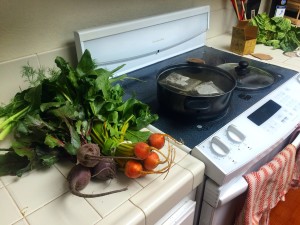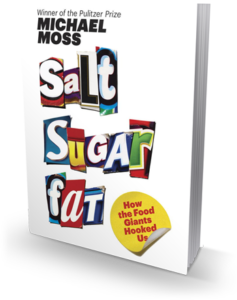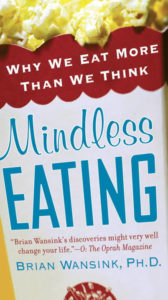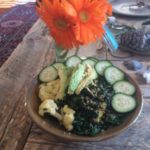Fooooooood. Who doesn’t love food? IT’S AMAZING. The tastes, the smells, the textures, the sensations, the social experience. Food rocks.
But food is also complicated. Food can either make you feel amazing and full of energy or make you want to curl up in the corner with an awful stomach ache. Food affects the body & mind, for better or worse. The cool thing is… you get to choose how you want it to affect you.
I study cognitive neuroscience, which makes you think of the brain, right? And correctly so. But I have a really cool factoid for you. There are 500 million nerve cells and 100 million neurons (brain cells) that exist outside of the brain and in the enteric nervous system, the system that deals with the gut. I’ve written a article about the gut-brain connection that you can check out here. The nuts and bolts of the article are that there is a strong connection between the brain and what goes on in your digestive system, meaning that food affects your mood.
So, the great question is, what should we eat to optimize our brain power, mood, and bodily functions? There are a gazillion diets out there and it can be hard to decipher what’s going on. I’ll offer you my advice and my experience in hopes that it gets you thinking as to what a healthy diet means.
Before I go into details, first I want to give you my golden rule of eating (and life in general):
Priority numero uno: listen to your body. Every body is unique. What makes you feel good may make another person feel their worst. There is not one ‘fix-it-all’ diet. There is no magic button to push. The only way to a healthy and happy you is to listen to what your body needs and how it reacts to certain foods. Navigate the the waters by dissecting all of the information out there, and then doing your own experimentation to find what makes you feel good and healthy.
Alright, so that being written, I think that there are general principles about healthy eating that are advantageous to follow. Here they are…
1. Kick out the processed stuff. Eat real food.
I just finished a great book entitled In Defense of Food by Michael Pollan that says we have focused too much on nutrients and not enough on how we consume the nutrients. We are eating processed ‘health bars’ because they claim to have certain nutritional ingredients even though they are processed and resemble a brick more than food. Nutrients are important, but food is more than just nutrients. Food is about the natural flavors, the art of preparing, and the act of chewing. Try to get your nutrients from real foods. Go to the local farmer’s market and support your community while picking through a beautiful array of fresh, organic produce. It’s so much fun! The people. The atmosphere. The smells. The craft. Make buying your food an adventure that you look forward to. This is my favorite way to spend a Sunday 🙂

Farmers Market Foood while making homemade Kombucha
2. What’s killing us: salt, sugar, fat.
That may sound familiar to you. That’s because it’s the title of a best-selling book by Michael Moss called, Salt, Sugar, and Fat are tricky because we need to consume them, but only certain types and in moderation. Refined sugars, table salt, and saturated fats with long chain fatty acids are the killers. Go for sugars from fruit and avoid white bread (which turns into insulinoegenic sugar in your body). If you want to get a little salty, use Pink Himalayan Sea Salt which has many of the minerals that your body needs when you’re craving salt. And for the fat – go for fats like olive oil and coconut.

3. Don’t go on diets.
Integrate health into your life and it’ll be a no brainer – don’t deprive yourself of something, but eat in moderation. If you need to make a change in your diet, do it in small incremental steps, slowly making it a part of your life. Don’t think of eating healthy as a chore, but as an exciting part of each day!
4. Power of three checklist.
Thank you Brian Wansink for this advice. Go check out his book, Mindless Eating. Brian recommends to look at your monthly calendar and write in each day three things you can do to reach your health goals. Things like, each more vegetables than meat today, drink only one soda, and avoid ‘white flour’ products. The goal is to check off these little things each day and see how you improve from here

5. Avoid labeling while gravitating towards diversity.
Don’t back yourself in a corner by deciding to call yourself ‘vegetarian’ or ‘vegan’ or ‘paleo.’ If you’re interested in those diets, experiment! But remember that your body is evolving and what it needs when you’re 18 may not be the same when you’re 42. Maybe for two years you stick to a vegan diet because it makes your feel amazing, but there may come a time when you need more animal products. Try not to get attached to a diet and instead think diversity. Eating foods from a vast array of sources is great for you body because you’re getting more nutrients and vitamins than if you stick to the same routine everyday. Have some staples in your diet. I recommend avocados and kale and quinoa. These are my ‘go-to’s,’ but everyday I add new vegetables and spices and grains because I know they have different nutrients that my body could use. Variety is the spice of life!

6. Most importantly, appreciate your food!
Have gratitude for it and savor every bite. When you’re eating, just eat. Be mindful. Feel the textures and taste the different nuances of the flavor. Listen to your body as your eating, be slower, and stop when you feel satiated. You’ll have a more pleasant eating experience and feel better from eating the right amount!
These are the keys that I believe comprise a healthy diet. Food is so much fun and can fuel you in an amazing way when you allow it to! Choose mindfully and healthfully and see what other incredible things happen in your life from feeling good on the inside.
Onward & Upward!
Hannah
To read more from Hannah about healthy food and living your best life, visit her website by clicking here.








